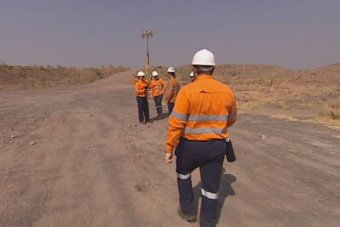
A coronial database of fly-in, fly-out worker suicides is to be set up by the Western Australia Government, but it has rejected a call for a separate code of practice to addresses mental health issues in the sector.
The Government also said it would not force resource companies to acknowledge their workforce is vulnerable to suicide.
It was responding to a parliamentary committee report on the impact of FIFO work practices on mental health, prompted by nine publicised suicide cases that triggered the inquiry last year.
The committee found in June that FIFO operations could lead to a “heightened risk of mental health issues” but a lack of accurate, accessible data made it impossible to establish suicide levels among any specific working group.
In its response tabled in parliament, the Government supported 15 of the committee’s recommendations, noted 14 and partially supported one.
Mines Minister Bill Marmion said it supported recommendations around gathering more data on the mental health impacts of fly-in, fly-out work.
“One of the things that actually surprised me is the report didn’t come with any data at all,” Mr Marmion said.
“So you can’t compare the mining industry with any other industry.
“We recognise the cohort of people that work in the mining industry are a vulnerable cohort: male and in the age group that mainly they pick up.”
The Government’s response said it has funded the development of a case management system for the Office of the Coroner for 2016-17.
That would create a single, searchable database of suicides for specific occupations, including FIFO workers.
But it would not force mining groups to acknowledge “their workforce is vulnerable to suicide”, noting FIFO work was a potential suicide factor in conjunction with other life stressors such as mental illness and alcohol and drug use.
No mental health code of practice just for mining industry
The Government will invite the Mental Health Commission and the Mining Industry Advisory Committee to work on strengthening existing codes of practice instead of creating a new one for FIFO workers.
“We’re looking at it but we already have codes of practice, a general code of practice,” Mr Marmion said.
“We’ve just got to make sure the current codes are reviewed and, you know, it’s a doubling up.”
The committee recommended a code of practice for FIFO workers address rostering issues, “with the aim of encouraging even-time rosters, and rosters that support mental health and wellbeing such as two weeks on, one week off”.
The Government said “some anecdotal evidence supports this recommendation, while other anecdotal evidence indicates some workers prefer the financial benefits of longer rosters”.
It said existing codes of practice would be reviewed to ensure they addressed the impact of fatigue.
The Government said it would also do more work on recommendations around mental health training programs, “mental health literacy” for FIFO workers and their families, and policies to manage suicide or suicide attempts.
Unions condemn Government for ‘abandoning FIFO workers’
Chamber of Minerals and Energy (CME) acting chief executive Nicole Roocke welcomed the Government’s response.
“We consider the approach to refer the matters to things like the the Mining Industry Advisory Committee and the Mental Health Commission will see action happen on the specific recommendations,” Ms Roocke said.
The chamber also supported the move to review existing codes of practice.
“CME doesn’t support the development of an additional code of practice to specifically address these concerns and these issues,” Ms Roocke said.
“What we do support is looking at existing codes of practice, whether these be looking at [re]working ours, or looking at the other breadth of codes of practice that do exist.”
The Australian Manufacturing Workers Union, the Construction Forestry, Mining and Energy Union, and the Electrical Trades Union said they were most concerned about the refusal to establish a FIFO Code of Practice.
“It underpins the integrity of all the other recommendations, and without it, weakens the 14 recommendations that the Government has agreed to,” CFMEU State Secretary Mick Buchan said.
“The mental health and well being of workers should always come first and we will continue to campaign to improve this work practice for the benefit of FIFO workers and their families.”
